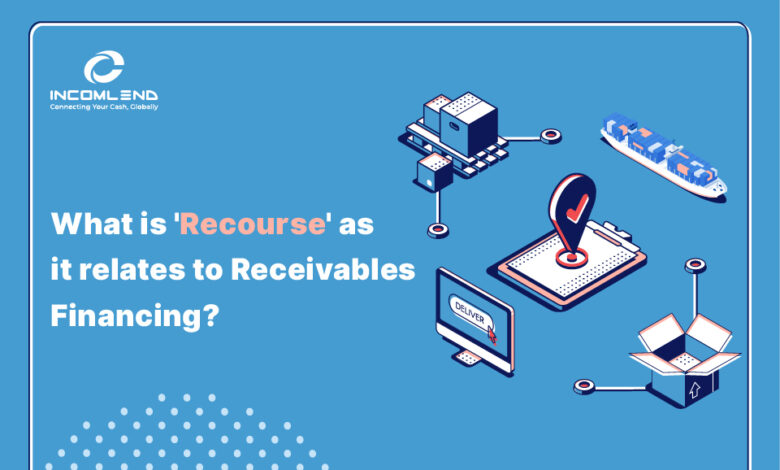What is ‘Recourse’ as it Relates to Receivables Financing?

Trade finance remains a crucial driver of international trade, enabling businesses of a variety of sizes and industries to access essential funding to accelerate cash flow to support and stabilize their operations. While there is an availability of a plethora of trade finance solutions, each with its own benefits, one popular and growing form of trade finance is receivables financing, which enables businesses to monetize their outstanding invoices. Within the realm of receivables finance, are two options: recourse and non-recourse receivables finance.
Receivables Finance
Like recourse and non-recourse, better to define receivables finance first in a general manner.
Recourse Financing
Recourse financing, one of the traditional forms of financing, is when the lender has the right to seek repayment from the supplier in the event that the supplier’s customer does not pay the invoice. In a traditional scenario, the supplier secures funding from the lender by pledging certain assets, including but not limited to, general accounts receivable, inventory, cash deposits, and other forms of collateral that may be liquidated to settle the liabilities in the event of non-payment. In other words, the supplier is ultimately responsible for the repayment of the financing, even when their customer defaults on their own payments.
Recourse financing is typically applied in situations where the lender takes a risk on the supplier’s creditworthiness compared to their customers’ creditworthiness.
Non-Recourse Financing
In contrast, non-recourse financing is when the finance provider typically does not seek repayment from the supplier in the event of non-payment. Instead, the lender purchases the invoices from the supplier at a discount and obtains repayment from the supplier’s customers at the time of invoice maturity, on the basis of the credit risk associated with the supplier’s customers.
Non-recourse financing is typically used in situations where the supplier seeks to accelerate their cash flows by obtaining cash up-front, instead of waiting for their customers to make payment at the time of invoice maturity. In some instances, suppliers may have exhausted their collateral sources to secure further funding and instead seek to diversify their borrowing sources. Non-recourse financing can also be used by businesses that: have a limited credit history, and wish to obtain credit protection and financing in one, easy-to-use package.
Benefits of Recourse and Non-Recourse Financing
Both recourse and non-recourse financing have their own unique benefits and drawbacks. Recourse financing typically offers lower interest rates and fees since a traditional lender underwrites on the basis of the supplier’s balance sheet strength and has a lien over the supplier’s collateral. However, recourse financing also carries a higher degree of risk for the supplier, as they are ultimately responsible for settling the liabilities even if their customer does not pay the invoice.
Non-recourse financing, on the other hand, offers lower risk for the supplier since the lender assumes the credit risk associated with the supplier’s customers. Since non-recourse financing involves the financier purchasing the invoices, the transaction is effectively off-balance sheet, which means the supplier receives cash in the bank, a reduction in trade receivables outstanding, without the added borrowings—effectively resulting in improved leverage and liquidity ratios. However, non-recourse financing typically comes at a premium, as no tangible collateral is pledged to the financier, which means the lender takes on a higher degree of risk.
Choosing the Right Financing Option
When it comes to receivables financing, the choice between recourse and non-recourse financing depends on a number of factors, including the supplier’s creditworthiness, their customer base, the level of risk they are willing to assume, and generally, their business goals. It is imperative for businesses to carefully consider their options and work with a reputable lender that can provide tailored funding solutions to meet their specific needs.
Incomlend offers a range of supply-chain financing solutions to support global trade. Our clients have access to best-in-class financing solutions that are tailored to their needs and include: factoring; reverse factoring; and invoice discounting. Incomlend’s easy-to-use online marketplace platform and dedicated support teams make it easy for businesses to manage their financing requirements with minimal lead time. With minimal requirements and tailored financing solutions, be it recourse or non-recourse.





